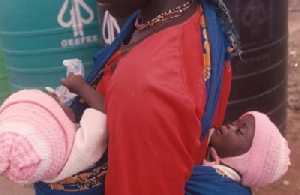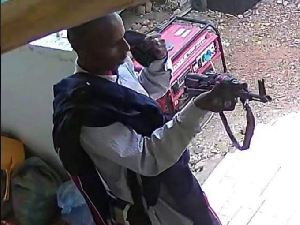Children are a blessing from God and it is the dream of every parent to have them. Even more exciting to most parents is when they give birth to twins. Parties are usually organised for family and friends to feast, celebrate and thank God for such blessings.
However, in some parts of Northern Ghana, having twins does not always come with such excitement and thanksgiving. The twins are often believed to be a curse.
The curse of having twins, according to this superstitious belief, must be broken, else the children may not survive or the parents may not make any meaningful progress in life. The curse is often broken through begging with the twins.
So a few months after delivery, sometimes against their wish, mothers are forced into the streets to beg for alms with their twins.
The situation at Madina Zongo is not too different from what happens in Northern Ghana and many Zongo areas of Accra.
As one walks on the streets of Madina Zongo, one is most likely to come face-to-face with mothers with their twins sitting under the scorching sun, by the roadside, with an umbrella as their only protection from the burning rays of the sun, begging. There are some who sit directly under the sun without an umbrella.
They sit from sunrise to sunset, counting on the benevolence of passersby for their own survival and for the survival of their twins. A mother holds an umbrella in one hand whilst feeding the twins with the other or caressing one of them to sleep.
Most of these women who were interviewed are of northern extraction. They travel all the way to Accra to “appease the spirits to remove the curses from their twins” or to embark on a business venture as the case may seem.
One of such women is Issahaku Alima, who comes from Kpaaru in the West Mamprusi District of the Northern Region.
Alima says her husband went for a divination four months into her pregnancy after they discovered from doctors, during one of her antenatal visits, that she was going to give birth to twins.
According to Alima, the soothsayer said the spirits of the twins in her womb demanded that she took them out for begging a few months after their naming ceremony.
“I wept on that day when my husband told me this. I was determined to resist any attempt to force me onto the streets to beg for alms, because I could not just imagine myself moving from house to house or on the streets as a beggar,” Alima said.
A few months after Alima was delivered, her husband started pressuring her to take the twins out on the streets to beg for alms.
Her refusal to embark on the “spiritual cleansing” exercise amounted to disobeying the decree of the soothsayer, the consequences of which, according to the husband, may be dire.
“My twins started falling sick and sometimes refused to eat for many hours and hardly slept at night,” Alima lamented. “My husband attributed this to my refusal to go begging and began to harass and threaten me.”
Alima decided to run to her parents for help, but the woes of her twins even deepened. Alima’s father eventually supported her husband’s position. She said she had no choice but to get on the streets with the children to beg. She later relocated to Accra, where her husband works as a driver, to continue her begging business.
“The first day I started this, I wept throughout the day. I was shy and felt so embarrassed. However, I heaved a sigh of relief when both children slept soundly later at night. They began to recover from their sicknesses and since then none of them has experienced any major sickness,” Alima said.
Alima was a banku seller at Kpaaru before she gave birth. She also had a mobile money business through which she was able to save GH?2,000 in the bank. However, ever since she took to begging, she has not been able to continue with her business.
Ironically, begging has been very lucrative. According to Alima, her money in the bank has now grown to GH?3,000, which she is saving towards the education of her twins.
Close to where Alima sits to beg are Ruhaina Yakubu and Memunatu Fuseini, who have similar stories to tell.
Ruhaina, however, had a different twist to her story. Her husband abandoned her and her twins shortly after she gave birth to them. She moved to stay with her father, who took care of them but unfortunately died three months later. This, she said, left her with no choice but to relocate to Accra to beg for a living.
Some scholars and traditional leaders have challenged the cultural and spiritual basis for twin begging. Dr Alhassan Sulemana Anamzoya, senior lecturer at the Sociology Department of the University of Ghana, says twin begging is poverty driven rather than a cultural or spiritual requirement.
“Poverty is the key factor in this. There is no culture in any of the tribes up north which requires mothers to take their twins out for begging,” Dr Anamzoya said.
Dr Anamzoya, who also hails from the Northern Region, said most of the women on the streets begging are poverty stricken and are only using the twins as an excuse to earn a living.
“Any man who is well to do will never allow his wife to beg with their twins. Have you ever seen a woman who has a car come to park by the roadside and sit under the scorching sun to beg?” Dr Anamzoya quizzed.
He cited numerous examples of mothers with twins, including his own sister and aunty, who were not beggars.
He said men who allow their wives to beg are simply irresponsible, and added that the issue has nothing to do with the culture of the north.
The Madina road is a trunk road. This makes it a very busy road. The exhaust fumes released by vehicles may be inhaled by people who sit by the side of the road. The health implications of this on babies may be costly.
According to Ruhaina, her twins often fall sick and she spends most of their earnings on medical bills.
Dr John Arko Mensah, a lecturer at the Department of Biological, Environmental and Occupational Health at the School of Public Health at the University of Ghana, said the inhalation of smoke from the exhaust of vehicles can affect the respiratory system and the cognition or learning abilities of the children.
“Because the central nervous systems of children are not well developed, the effect of inhaling exhaust fumes from cars is more pronounced in them than in their mothers. It can have long-term effects on their learning abilities,” Dr Mensah said.
Dr Mensah said the mothers may also suffer psychosocial problems such as stress and mental health as a result of prolonged sitting.
According to Alima, there is no specific duration for twin begging. She said she will continue to beg until her twins can walk.
“The soothsayer did not specify how long we should do the begging, so as soon as they begin to walk I will stop and continue with my business,” Alima said.
Opinions of Friday, 22 July 2016
Columnist: Yahaya MASAHUDU















